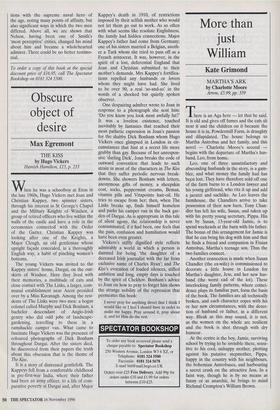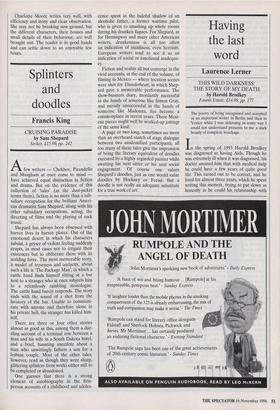More than just William
Kate Grimond
MARTHA'S ARK by Charlotte Moore Arrow, £5.99, pp. 359 There is an Aga here — let that be said. It is old and gives off fumes and the cats sit near it and the children on it because the house it is in, Powdermill Farm, is draughty and dilapidated. The house belongs to Martha Antrobus and her family, and this novel — Charlotte Moore's second begins with the departure of Martha's hus- band, Leo, from home.
Leo, one of three unsatisfactory and absconding husbands in the story, is a gam- bler, and what money the family had has be,en lost. They have therefore sold off one of the farm barns to a London lawyer and his young girlfriend, who ritz it up and add a jacuzzi and suchlike. As Leo leaves the farmhouse, the Chandlers arrive to take possession of their new barn. Tony Chan- dler has left his wife, Susan, and taken up with his pretty young secretary, Pippa. His son by Susan, 13-year-old Jamie, is to spend weekends at the barn with his father. The bonus of this arrangement for Jamie is that he can bring his dog with him and that he finds a friend and companion in Finian Antrobus, Martha's teenage son. Thus the two families connect.
Another connection is made when Susan Chandler (the ex-wife) is commissioned to decorate a little house in London for Martha's daughter, Jess, and her new hus- band (the worst cad of the lot). These interlocking family patterns, where coinci- dence plays its familiar part, form the basis of the book. The families are all technically broken, and each character copes with his or her new circumstances, with the deser- tion of husband or father, in a different way. Bleak as this may sound, it is not, as the women on the whole are resilient and the book is shot through with dry humour.
At the centre is the boy, Jamie, surviving school by trying to be invisible there, sensi- tive to his cool, unhappy mother, plotting against his putative stepmother, Pippa, happy in the country with his neighbours, the bohemian Antrobuses, and harbouring a secret crush on the attractive Jess. In a faint way, though he is by no means as funny or as anarchic, he brings to mind Richmal Crompton's William Brown. Charlotte Moore writes very well, with efficiency and irony and clear observation. She may not be breaking new ground, but the different characters, their houses and small details of their behaviour, are well brought out. The reader is in good hands and can settle down to an enjoyable few hours.



















































































 Previous page
Previous page